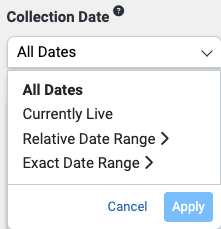You can use the text box on the questions page to search for keywords in questions. To search, enter one or more search terms in the search box and hit return/enter or click the magnifying glass at the right.

The main search field searches keywords in question titles, responses, and tags. It explores a wide range of questions in all categories. We suggest you start with the tags filter, then narrow your results using the main search box if needed.
In the search bar, you can use Boolean logic with the following symbols:
- Add a plus sign (+) meaning AND to help narrow the search to a list of questions with all the terms mentioned: bank + store.
- Use a pipe symbol (|) meaning OR to expand the search to include any question with either term used: bank | store.
- An asterisk (*) acts as a wildcard, so pric* would give you results that include price, prices, and pricing.
- Use quotation marks to designate two or more words as a phrase, such as "client question". Be aware that if you use quotation marks to indicate a phrase, questions containing the individual words won't be returned.
- A minus sign (-) excludes a term, so if you only wanted items that mention bank without mentioning store, you would search for bank -store.
- Parentheses group things together, so if you wanted to search for items that mention credit and union or bank, you would search on (credit + union) | bank.
If you want to find one term in proximity to another, put both terms within quotation marks followed by a tilde (~) and the maximum number of words you want between them. To see music within ten words of stream, enter "music stream" ~10. (There cannot be a space between the second quotation mark and the tilde.)
If you know the exact text of the question, use quotation marks around that text for the best search results.
Once a search is performed, the question list will automatically change to be ordered by relevance. Questions containing the search term in the question text are more relevant than those containing the search term in one of the question responses. When more than one search term is used, questions containing a higher number of search terms are more relevant than those containing fewer search terms.
Question filters
The question filters are below the text search box. You can narrow down the list of questions using the question's features (e.g., tags, the type of question, when it was launched, when it was completed, etc.). These filters can be used with text box searches for more complex queries.

When you've selected a filter item, it turns blue to help you track your current criteria.
You can choose to search for text in any combination of Questions, Answers, and Tags.
Questions may be filtered by:
- Type
- Permissions
- Favorites
- Timing
- Format (see below)
- Collection Date (see below)
- Minimum Responses (see below)
- Tags (see below)
To search for a research question, select the Value and Profile classifications. If you only want to see questions from your organization, select Custom under Sharing Permissions, too.
Format
The Format filter allows you to specify whether you want the search to return radio questions, checkbox questions, or both.

There are two caveats to using this filter.
First, the answer options for checkbox questions are considered radio questions. Choose only the checkbox option to see only the checkbox (parent) question in the search results.
Second, currently, searches return only radio and checkbox questions. Matrix questions are not returned, but their answer options are returned as radio questions.
You can learn more about the various question formats here.
Collection date
The Collection Date filter permits you to search for questions that are Currently Live (collecting responses) or that were collecting responses during a Relative or Exact Date Range.

Minimum responses
Setting the Minimum responses filter limits results to questions with at least the selected number of responses. If used with a date filter, it will show only those questions with at least the selected number of responses within the given date range.
Tags
Taxonomy is shown first, followed by the CivicScience tags. Selecting multiple taxonomy or tag filters doesn't narrow your search. The system assumes you mean, for instance, tag1 OR tag2 when you choose more than one tag, so the search is expanded.
